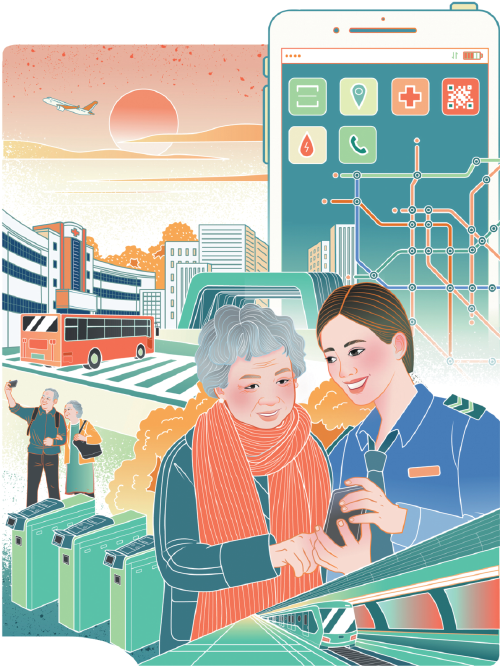
Many of China's 250 million senior residents have been struggling to adapt as more services go digital
One of the biggest obstacles Zhu Zhongzhen has faced since moving to Beijing from a village in Guizhou province to look after her three-year-old granddaughter is her lack of expertise with a smartphone.
She can handle basic functions such as taking video calls and scrolling for updates on video-sharing social networks. But everything else associated with the use of a smartphone, such as hailing a taxi or making mobile payments, is out of reach.
"I often find myself needing extra help from staff members to find my health code on my phone," the 65-year-old said, explaining that even going to a supermarket means extra trouble for her as more cashiers prefer mobile payments to cash.
With the help of mobile technology and big data, China is using a color-based QR health code on smartphones to reflect the risk levels of places a person has visited, with a green code becoming a prerequisite for entrance to public spaces such as shopping malls and hospitals in some areas.
Zhu's experience epitomizes the inconveniences faced by China's 250 million elderly residents, many of whom struggled as more services went digital during the COVID-19 pandemic.
To ease their plight, the government must beef up efforts to solve the difficulties they face due to their lack of competence in using smart technologies, the General Office of the State Council said in a policy document issued on Nov 24.
Traditional forms of service in various areas must be retained for elderly residents, and more smart services and products that cater to the demands of seniors must be offered, the document said.
It pledged to solve the most pressing problems seniors face in their daily lives, including transport and healthcare, and ensure their basic needs are met.
Zhao Chenxin, secretary-general of the National Development and Reform Commission, told a news conference on Thursday that the key thread of the new policies is to make sure traditional ways of accessing services are preserved as the use of digital technologies becomes more widespread.
"It requires joint action from all of society to help groups including seniors better adapt to a smart society," he said. "We need to fully respect the demand from minorities, which is an indicator of the level of inclusiveness of our society."
To ensure the daily lives of seniors will not be affected by pandemic containment measures, the document said the checking of health codes is no longer mandatory except in special places such as airports, railway stations and border ports.
Local authorities should not use digital health codes as the sole form of proof that residents have not traveled to high-risk areas, and the elderly must be able to use other methods such as registering their IDs or using written certificates, it said. Authorities will refine ride-hailing services, make it easier for the elderly to take public transport and offer a variety of channels for them to make appointments with doctors, it added.
No units or individuals will be allowed to refuse to accept cash payments, the document said, adding that retailers, restaurants, shopping malls and parks must support payment channels including cash and bank cards. Public spaces such as parks, tourist spots, libraries and exhibition halls must have service windows and telephone hotlines to offer booking services for the elderly.
Du Peng, vice-president of Renmin University of China and a professor of gerontology, said the document pointed the way for the application of smart technologies in the near future. He said service providers shifting reservations online was a trend even before the pandemic.
"The pandemic has amplified the plight faced by some seniors who found their basic lives made even more inconvenient by digitalization," he said. "Digitalization is supposed to make everybody's life better. As it turned out, it was not for everybody."
The policy document seeks to rectify the side effect of digitalization that has left many people, especially those not familiar with using a smartphone, unable to access many services, he said. "It also comes as a reminder for the whole of society that the carrying out of new rules should not go against principles of service or even the law," Du said.
Zhou Jin contributed to this story.
